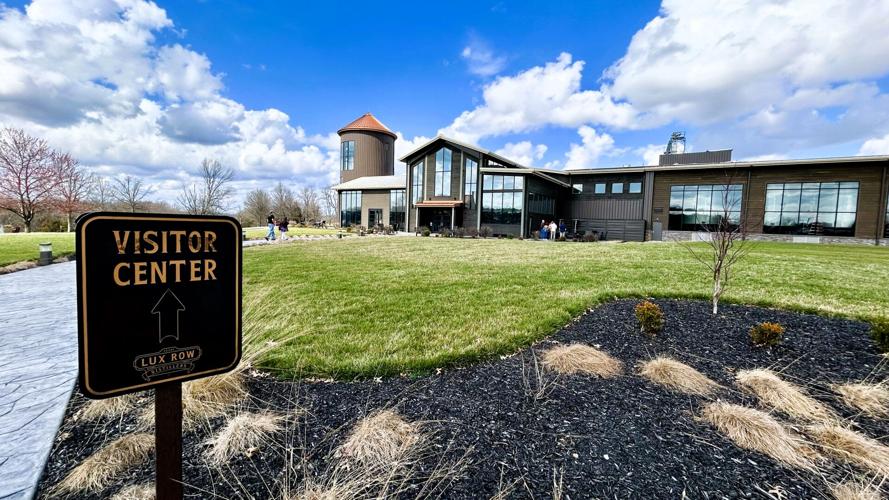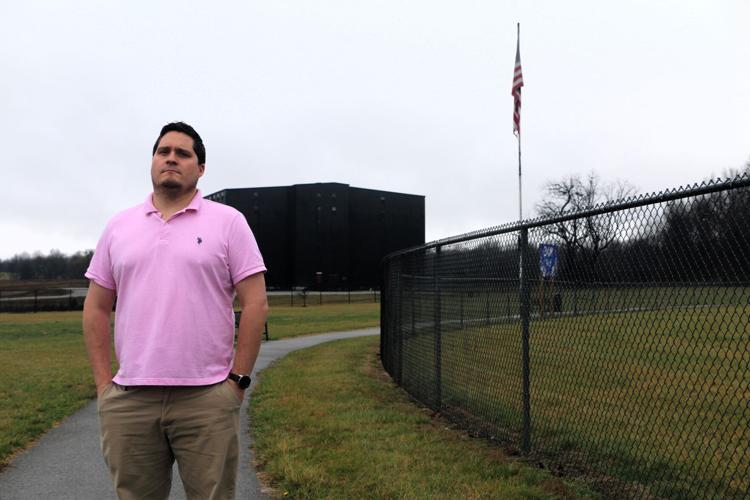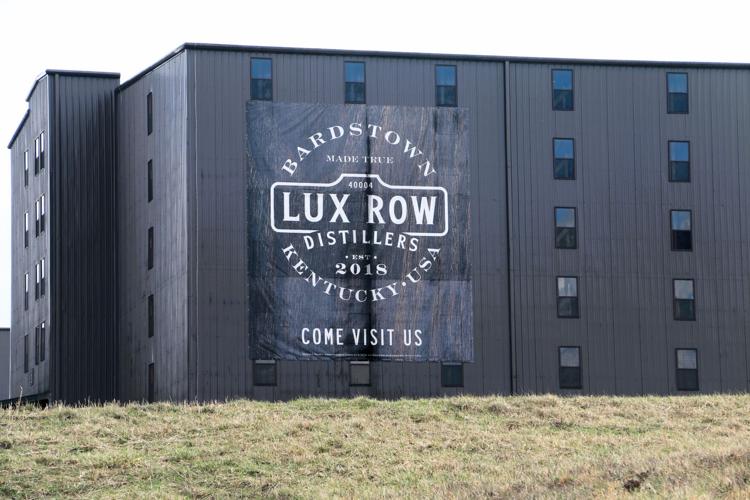LORETTO, Ky. (WDRB) -- Early last year, Nelson County agreed to help bourbon-maker MGP Ingredients finance the construction of five new warehouses to store thousands of bourbon barrels produced at MGP's Lux Row Distillery in Bardstown.
Months later, MGP secured a similar agreement from a much smaller community in a wholly different area of the state. The northern Kentucky city of Williamstown — population 4,000 — pledged to help the distiller add six bourbon warehouses, even agreeing to build a water tower to service the site.
But now, MGP, a $2 billion company based in Atchison, Kansas, has filed lawsuits against both Kentucky communities, claiming their local governments are unfairly blocking the construction of the whiskey warehouses.
In separate cases filed in January and February, MGP accuses Nelson County and the municipal government of Williamstown of breaching contracts with the company, saying it has spent millions of dollars on the planned warehouse projects that are now stymied.
"We have filed these suits seeking only to have commitments made to us honored and to protect our rights as landowners," MGP spokesperson Jenell Wallace Loschke said in an email, declining further comment.
Nelson County's top elected officials, Judge-Executive Tim Hutchins, declined to comment. Williamstown Mayor Mark Christoher didn't respond to requests for comment. In a court filing, Nelson County has sought to have MGP's complaint dismissed, while Williamstown hasn't yet filed a response.
While the circumstances differ, in each case the local government used its zoning and permitting powers to deny MGP permission to move forward with the warehouses on the particular sites where the distiller seeks to build.
'There's gonna be a backlash'
The legal battle highlights the frayed relationship between Kentucky's "signature" bourbon industry and the small-town communities that feel increasingly encroached upon by distillers' voracious need for land to store aging whiskey.
The bourbon resurgence that began in the early 2000s shows no sign of ebbing, with the number of aging whiskey barrels in Kentucky more-than doubling in the last decade, to 12.6 million, according to the Kentucky Distillers Association, the industry's trade group.
Tensions between distillers and local communities boiled over in 2023 when the state's Republican-controlled legislature voted to phase out a tax on aging barrels that primarily benefits local jurisdictions with distilleries and warehouses, such as Nelson County and Williamstown.
Lawmakers sunset the tax over vehement objections from local officials in bourbon-heavy counties like Nelson, Bullitt and Marion, who said the tax money was their primary recompense for the costs of hosting the ever-expanding industry.
Those costs include the black mold-like "whiskey fungus" that continually appears on nearby properties, maintenance of rural roads and fire protection capable of containing blazes in four-story buildings full of flammable wood and liquid.
As the controversial tax repeal was debated, some county officials warned they would respond by weaponizing their local zoning and permitting powers to keep the industry out.
"I've talked to several counties. The zoning laws — you know — it's gonna hurt them (the distillers). There's gonna be a backlash," Hutchins, the Nelson County judge-executive now being sued by MGP, said during a March 13, 2023, legislative hearing.
Eric Gregory, the president of the Kentucky Distillers Association — the primary proponent of repealing the barrel tax — declined to comment for this story.
'We do not want your building here'
To be sure, localities aren't blocking every new distillery or barrel storage facility, known as a rickhouse.
Nelson County, for example, just approved Heaven Hill Brands' plan to build up to 10 new rickhouses off an arterial highway north of Bardstown. The family-owned Heaven Hill is also spending $135 million on a new Bardstown distillery to open this year.
But the legal battle between MGP and the Kentucky localities is a sign of things to come, said Josh Ballard, a city commissioner in the small town of Loretto, the home of storied distiller Maker's Mark.

Josh Ballard, a commissioner of the city of Loretto, Ky., on March 6, 2024, at Loretto's city park near Maker's Mark barrel warehouses. (WDRB Photo)
Speaking in the small town's public park, which is shadowed by a dozen gray Maker's Mark rickhouses, Ballard said the political calculus for local officials has changed.
Today, for example, barrel taxes paid primarily by Maker's Mark make up the majority of Loretto's general tax revenue, Ballard said. The eventual zeroing out of that money means mayors and county judges have less incentive to stand up to constituents who don't want bourbon in their backyards, he said.
"I think communities across Kentucky are looking at the cost of the warehouses, the mold that's generated, the flammable alcohol that's stored, the wear-and-tear from the semitrucks going up and down the road ... and then you look at the tax generation that will not be there in the future," Ballard said.
"It's pretty common sense for communities across Kentucky to say, 'No, we do not want your building here. We don't want to increase taxes on citizens to pay for your warehouses, which is what will happen.'"
MGP seeks a brand name

Lux Row's $80 million distillery in Bardstown, Kentucky, which is owned by Kansas-based MGP Ingredients, March 4, 2023. (WDRB Photo)
Unlike Jim Beam or Buffalo Trace, MGP is not a brand name in the bourbon industry. In fact, the Kansas-based company makes most of its money selling distillate or aged whiskey to others who then bottle and sell it under their brands.
For bourbon sleuths, a disclosure like "distilled in Indiana" has historically been a clue that whatever's in the bottle may have originated from MGP's distillery in Lawrenceburg, Indiana.
But over the last several years, MGP has been trying to break into the world of high-margin, brand name bourbon.
The company came to Nelson County — the epicenter of the industry — in 2021 when it bought family-owned Luxco, the distiller behind bourbon brands like Ezra Brooks, Daviess County and Rebel (formerly Rebel Yell). Luxco had just built an $80 million distillery called Lux Row with eight rickhouses in Bardstown.
As MGP's bourbon business grew, so did its need for rickhouses to age the whiskey.
After running out of space at the Lux Row property, MGP's Luxco began looking for green fields near the distillery in Bardstown to build warehouses, settling on a 182 acres about four miles away.
In January 2023, Nelson County agreed to help Luxco finance the new rickhouses by using the county's borrowing power to issue bonds that would be repaid by the distiller. At the time, the debate over repealing the barrel tax was heating up.
But Luxco agreed to continue paying those taxes to Nelson County jurisdictions regardless of the legislature's action — so the tax revenue from the rickhouse project would be guaranteed for decades to come, according to MGP's lawsuit against Nelson County.
In May 2023 — a little more than a month after Democratic Gov. Andy Beshear signed the barrel tax phase-out into law — Nelson County's fiscal court paused all applications for new barrel warehouses.
County commissioners said they had "concerns that the increase in distilled spirits storage facilities has resulted in a loss of agricultural land, may become a burden on public services and infrastructure (and) has altered the character of Nelson County."
Months later, Nelson County emerged with new zoning requirements for whiskey warehouses, criteria that the Luxco project fully satisfied, according to MGP's lawsuit.
Yet the county's planning commission and fiscal court still denied the project. The area where the rickhouses would be built is more suburban than rural and "more appropriate for a residential development," the planning commission said in a September vote.
Williamstown, the small town in northern Kentucky, also agreed in September to issue county bonds to help finance six barrel warehouses, according to MGP's lawsuit. MGP already has five whiskey warehouses in the city, according to the suit.
But in November, Mayor Mark Christopher changed course, sending MGP a letter saying he no longer supported the project because of "the financial, environmental, and economical impact the City will incur," according to the lawsuit.
During a special meeting about the warehouse project in December, the "overwhelming majority of the concerns" among Williamstown residents related to the "naturally occurring microflora" commonly called whiskey fungus despite the property's industrial zoning, according to the MGP lawsuit.
In January, Williamstown's council repealed the ordinance it had adopted months earlier agreeing to support the project, MGP said in the lawsuit, despite the city having "no legal basis to do so."
MGP reached deals with Nelson County and Williamstown to finance their rickhouse expansions using “industrial revenue bonds.”
Those municipal bonds have been a common way for cities and counties to help distillers make investments in their jurisdictions. The local government acts as a pass-through for the distillers to borrow money for construction, while also providing the distillers a 15- to 40-year exemption from real estate taxes on the project sites.
But given tensions with the industry, city and county officials may think twice about future bond deals with distillers.
MGP seemed to warn investors of this in its annual report filed Feb. 22: “We may not be able to use industrial revenue bonds in the future due to legislative, regulatory, and related changes in the state of Kentucky.”

Lux Row Distillery in Bardstown, Kentucky, owned by Kansas-based MGP Ingredients, opened in 2018 at a cost of $80 million. (WDRB Photo)



